The Hunger Games: Mockingjay – Expectations from Literature to Film
*Spoilers ahead for The Hunger Games Trilogy*
Suzanne Collins has captured the hearts of people around the world with her trilogy: The Hunger Games. Her presentation of a post-apocalyptic, dystopian society that destroys childlike innocence and encourages docility with mediated violence was so astoundingly powerful that Gary Ross directed a film version of the first novel only four years after its release.
For those that are unfamiliar with the trilogy, The Hunger Games is set in Panem, a world comprised of 12 districts. Society had to pick itself up again under the rule of President Snow after a terrible war that nearly destroyed everything and everyone. In order to prevent such a tragedy from striking again, each district in Panem would offer up “tributes,” a young girl and boy between the ages of 12 and 18 to fight to the death “in a pageant of honor, courage and sacrifice.”
This “pageant” known as “The Hunger Games” pulls in a girl from the most impoverished District 12, Katniss Everdeen. What follows in the trilogy is a story about a heroine teetering between the great need for change, her representation as a symbol for rebellion, and her fear of harming others from her actions. The compelling plot and thematic elements surrounding the books have been well-translated into film with minor backlash from its fanbase (with one or two minor hiccups), and with two films coming out for the last book in 2014 and 2015, there are high expectations for what is to come.
There are a variety of films that nearly ruined a franchise and ignited riots across media platforms, The Last Airbender for example, but The Hunger Games has thus far been very successful. With one last part to the trilogy, the finale is a make or break opportunity. With the decision to split the final book between two films, there is plenty of room to put all of the essential scenes and capture the primary themes.
So what does the film need to do a great finale justice? And what can ultimately break the film? This article shall break down major moments and themes in the trilogy to properly explore what must happen on the big screen, and how, for the film to ultimately be successful in fan’s eyes. It will be looking internally and moving to the external. The inner workings of the characters’ minds and the way this comes across on screen is essential for the film’s themes to come across clearly.
Part I: The Bones
A movie is not just what is seen on screen. A movie consists of endless amounts of production decisions, the works of screenwriters, directors, a design team, etc. In order to understand what is to be expected of the film itself, there must first be an understanding of the team going into the work.
The Screenplay
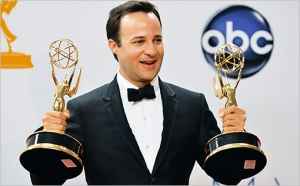
To start, one must take the basic structure of the books and translate them into film. Naturally it is nearly impossible to fit every last detail of any novel into film format, and the screen writers have to make very distinct choices of what to keep in to tell a story, and what to take out to keep the film compact. The first film was written by Gary Ross and Billy Ray with contributions by Suzanne Collins, and the second film was written by Michael Arndt and Simon Beaufoy.
This next installment of the trilogy is being written by Danny Strong. Danny Strong is an actor and screenwriter best-known for his role as Jonathan Levinson in Buffy the Vampire Slayer and has won an Emmy for his HBO movie, Game Change.
As a man who initially started out in Hollywood as an actor, Strong never meant to commit to writing:
I started writing to get my mind off of my auditions. It was more like a hobby than a goal. I wasn’t going to attach myself to my scripts; I was just going to try to do it separately. (Busis)
Even so his Emmy is evidence of a passionate man who dedicates everything he can into his writing. Before writing the game changer, he was sure to research every aspect of Sarah Palin as he could. He interviewed 25 people on the McCain-Palin campaign and managed to get a variety of different opinions that created a person out of the media caricature. This sort of dedication to Game Change is precisely the kind of commitment viewers want out of The Hunger Games: Mockingjay.
As for Mockingjay — I can say very little about it. I was approached to pitch on it, and I just literally holed myself up for a week and came up with a presentation for two movies. I pitched my little heart out, and got the job. I literally can’t say anything else — I will just get in trouble. It’s, like, Defcon 5 on security over there. It’s really crazy. (Busis)
As a screenwriter for The Hunger Games: Mockingjay he has the benefit of writing in pivotal moments from outside of Katniss’s mind. Through these moments he must then capture the major themes that are imperative for the film’s success. These written scenes must then come to life on the big screen.
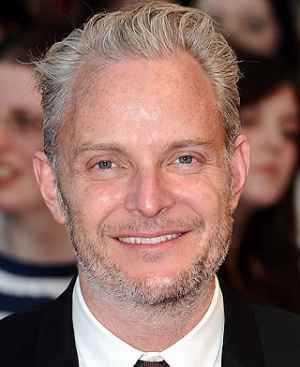
Lionsgate entertainment once again signed on Francis Lawrence, the director for The Hunger Games: Catching Fire, for the two-part finale. Best known for Constantine (2005) and I am Legend (2007), Lawrence has also worked on a multitude of music videos including Destiny Child’s “Emotion” and Britney Spears’s “I’m a Slave 4 U”. While he may not have many motion pictures under his belt, it’s evident that Lawrence has much to bring to The Hunger Games: Mockingjay.
As a relatively fresh face in the directing game, Lawrence’s integrity has been compromised once or twice before by his producers and his production team. He once mentioned that “I Am Legend” would have turned out better if he was able to stick to the “last man on Earth” plot-line. However, because he lacked the clout and the Hollywood film experience to back him, there was little he could do.
Francis Lawrence has a distinct understanding of the challenges he must face. Directing from literature to film never translates perfectly, and as a director he must make very distinct choices. At the same time, he is in the unfortunate position of coping with the choices made by his predecessor, Gary Ross, who directed the first film. Lawrence is in a balancing act between making the film series his own, and honoring the framework left behind.
In an interview with the Huffington Post, it is clear that Lawrence has great respect for the story that Collins’s wrote and that he wants to tell that story in the best way possible. He recognized that the second movie could not be about the spectacle of the capitol but he had to further portray the Capitol’s corruption that the first film only hinted at. In The Hunger Games: Catching Fire he made the film “as rich and emotional an experience as possible,” and the emotional experience only grows in the final two installments. The last two films have so much more at stake than just the lives of the tributes, but the entire infrastructure is what must then come down. In Mockingjay, death is less of a theme than an unfortunate result of a much bigger picture.
With a two-part finale in mind, one cannot help but wonder what this implies. Lawrence loves cliffhangers, and is even basing his decisions for the two-part finale on a series best known for its cliffhangers, Breaking Bad. To him, each episode of Breaking Bad “opened bold and they end bold and [Lawrence] just think[s] that’s fun stuff” (Ryan). The first film has to end at the culmination of all of Katniss’s anxieties and fears coming to life. Jennifer Lawrence must build up her character, prepared to fight, only to fall again. The best moment for this to happen, is when Peeta warns them of the Capitol’s bombing of District 13. Immediately after Peeta’s warning, District 13 evacuates its upper levels and the refugees go far underground.
If Lawrence believes a movie should “open bold” then the second movie should open with a step in a new direction. Mockingjay dragged on and had little to offer beyond Katniss’s suffering, but the films have the opportunity to provide sequences that were only mentioned in the books. A significant way to open up the second film is through Peeta’s rescue, voiced over by Katniss’s interview about Peeta. Katniss’s suffering in the third book is dry, and dull. However, filming Peeta’s rescue allows the audience to clearly see how important Katniss is to the cause. Everyone knows how important Katniss is but Katniss, and the audience should have the opportunity to see the same.
Characters and Casting
The cast is what ultimately brings fans to the film, and – so far – the trilogy has yet to disappoint.However, with the death of the ever-talented Phillip Seymore Hoffman one has to question what the films will bring to the table. New characters will be introduced in this film, and other characters will (or at least should) finally have the spotlight they deserve.
Plutarch Heavensbee
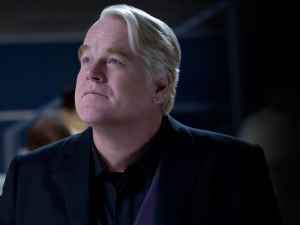
Phillip Seymour Hoffman’s portrayal of Plutarch is, and was phenomenal. In the second book and film, Plutarch was someone that everyone was unsure of. He seemed to have a higher purpose, but whether it was for himself or for the greater good was not evident until the very end of The Hunger Games: Catching Fire. That being said, the concern revolving around Plutarch has less to do with Phillip Seymour Hoffman’s performance and more to do with what is to become of the character with his passing.
Thankfully, the producers have made the very wise choice not to recast. In fact, Hoffman only missed eight to ten days of filming. While this is pivotal within the scope of filming, the decision has been made to give some of Plutarch’s more pivotal lines to other characters so as not to cheapen Hoffman’s work. According to director Francis Lawrence they “are going to put him into those scenes, but [they’re] only using real footage. [They’re] not creating anything digital or a robotic version of him” (Goodman).
So, all that is left is for Plutarch’s sickening enthusiasm for broadcasting to show. He treats life like a reality show and takes pleasure in portraying excellent footage. Even when tragedy strikes he makes a point to turn it into excellent footage to be broadcast to the masses.
President Alma Coin
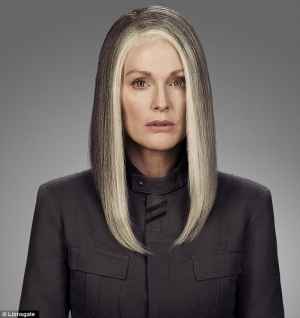
President Coin is a woman who has power and loves it. Within the pages of Mockingjay it is very evident that she wants Katniss to know her place, and that she is quite fond of control. That being said, her intentions at least seem good. While reading the book, it is much easier to distrust Coin because everything is filtered through Katniss’s broken psyche. She is a young woman coming-of-age and dealing with war all at once. Katniss’s issues with authority have been evident since before The Hunger Games and it can sometimes be easy to forget that just because Katniss distrusts someone, it does not necessarily mean everyone has to at first.
Julianne Moore, the actress cast to play President Coin, very astutely recognizes the benefits of playing Coin. “Coin is very sparingly drawn, because you don’t know who she is because she’s only spoken about from Katniss’ point of view…And Katniss immediately distrusts her in the way that sometimes a young person will distrust an older person who’s not familiar to them or in a position of authority” (Cassie).
Annie Cresta

Annie Cresta represents psychological trauma at its greatest. During the 70th Hunger Games, she witnessed her district partner’s beheading and was driven to insanity as a result of that. After witnessing this death she hid until the entire arena flooded, effectively killing off all of her competition. However, she is so much more than her psychological trauma; she represents hope.
When Annie is saved by the rebels, it is the first sign of hope and happiness for Finnick and District 13. She is the reason why Finnick cannot fight against the Capitol and she is the reason why Finnick can relate to Katniss’s own fears about Peeta.
Primrose Everdeen
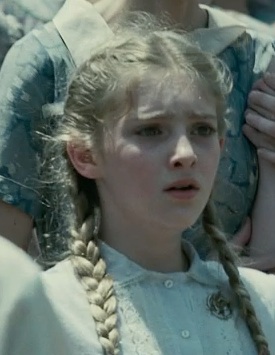
Primrose’s character development takes a darker turn in the final book. She is a true product of innocence tarnished by a cruel reality, but – unlike Katniss – she is able to maintain her gentle side.
I look at my little sister and think how she has inherited the best qualities our family has to offer: my mother’s healing hands, my father’s level head, and my fight. There’s something else there as well, something entirely her own. An ability to look into the confusing mess of life and see things for what they are (184).
As Prim’s surrogate mother after their father’s death (and their mother’s inability to function), Katniss was able to give herself hope. Prim wanted to be a doctor and, while Prim was not phased by death and pain, she also did not stoop so low as to cause death. She chose the path of the healer and has a very distinct understanding what is happening around her.
Gale Hawthorne
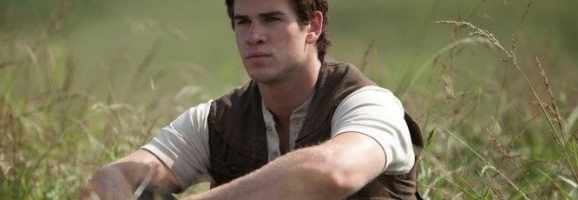
Gale has been given some minor opportunities in the previous two films to show his discontent with the Capitol, but not enough opportunity to show his absolute rage. Gale’s unforgiving attitude towards the Capitol is precisely why he makes a good leader for the rebellion. He is willing to do whatever it takes to succeed. Now, this does not necessarily mean that he is morally correct, but it does mean that he can match anger with action.
He was the first person in the trilogy to present the idea of rebellion to the readers, and it was he who ultimately saved a number of people from District 12. However, while he starts out as a hero, Gale begins to devolve into a cruel, unforgiving crusader of sorts. He starts to use all of his prowess as a hunter and mercilessly kills anyone allied with the Capitol. And it is one of his traps that ultimately kills Prim.
Peeta Mellark
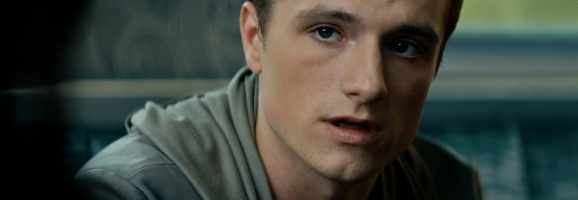
Out of all of the characters in the trilogy, Peeta has to go through the most pivotal change. From the happy, naive, young man of the first two films, Josh Hutcherson must dig deep and give his character an entire personality flip. When he is finally saved by the rebels, his mind has been corrupted and “hijacked” to believe that Katniss is a mutt and the reason for all of his problems.
“Don’t trust her , Delly…I did, and she tried to kill me. She killed my friends. My family. Don’t even go near her! She’s a mutt!” (190).
His character progression becomes more pivotal when he starts to pull himself out the haze. Peeta is no longer the naive boy that fell in love with Katniss and he begins to see the types of horrible things that Katniss did to him. This is where even more problems can appear for the upcoming two films. Peeta is not someone that we fell completely in love with. So when his character does an entire 180 where will our sympathy go? So much sympathy has been placed on Katniss Everdeen that the audience can forget that she has many unlikable traits. In the moments prior to Peeta’s hijacking, when he is only seen on a television screen, the audience must see his descent into madness.
Part II: The Body
After everything is established, what is then taken from the film is most important. Will the themes properly be portrayed? Will proper screen time be given to specific characters? Will there be a sense of satisfaction from fans or will viewers leave feeling empty? There are very necessary and pivotal moments that need to happen in the film, and the putting them in can ultimately make the film.
Katniss Everdeen
The film Catching Fire ended with Katniss learning about the rebel cause. Plutarch, Haymitch, and a number of her allies during the Quarter Quell all intended to free her from Capitol clutches. However, this rescue mission came at a price: Peeta. While Katniss had been saved, they had no chance or opportunity to rescue Peeta. There was too much risk involved with that possibility, but Katniss – a strong-willed individual – does not accept this. The first two parts of the book are devoted to Katniss’s guilt over leaving Peeta behind during the Quarter Quell, and her inability to trust the rebels, the capitol, and her own self-worth.
Katniss has much difficulty dealing with the role thrust upon her as the Mockingjay. Her inability to acknowledge her importance is strengthen by her fear of the effect she has on others. Katniss knows that people die at the hands of The Capitol, but she is very aware that many deaths have been due to her own actions. Had she remained docile like Snow wanted, and had she not rebelled in the first film, no one would have died beyond the Hunger Games.
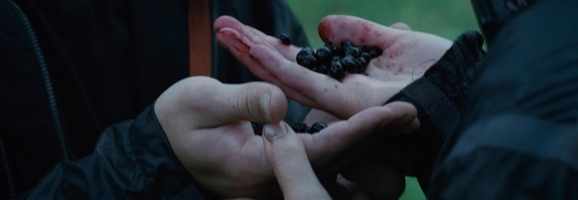
Her insecurities are further fleshed out with her guilt over Peeta’s capture and the bombing of District 12. Katniss knows that, had she continued playing Snow’s game, everyone would have survived. Although she was unaware of her extraction and the impending rebellion in the first place, Katniss acknowledges that the blame ultimately falls on her. The challenge this film then faces, is contrasting Katniss’s turmoil, with her drive to ultimately defeat The Capitol.
Suzanne Collins’s trilogy is written in first-person subjective. The most readers can understand is entirely through Katniss’ internal monologue and observations of the world. Jennifer Lawrence has continuously delivered superb performances for each film but this one could very well be the most taxing. A review in the Washington Post had this to say about Jennifer Lawrence’s performance in Catching Fire:
Jennifer Lawrence, who in Katniss has found a character that chimes perfectly with her own persona as an earthy, blunt-speaking ingenue suddenly thrust into a world of celebrity and media-fueled idol worship. Somehow managing to look like a real, flesh-and-blood girl even in “Catching Fire’s” most bizarre tableaux, Lawrence is never less than compelling, her rounded cheeks suggesting innocence but her sharp, alert gaze suggesting otherwise, whether she’s aiming her notorious bow and arrow or scrutinizing Cinna’s latest incendiary creation.
From The Hunger Games to Catching Fire it is evident that the Capitol’s affect on Katniss’s psyche grows by the day, and Jennifer Lawrence was able to bring it to its peak in the Jabberjay sequence in Catching Fire.

However, as we know, Katniss is more than the psychological trauma she experiences. She is strong, bold, sarcastic, and rebellious. Her utter lack of respect for undeserving authority is exactly why she is primed to be the Mockingjay. The next film needs to find the healthy balance between Katniss’s insecurities and her ability to rise above the ashes.
“That’s her…Right there. With the costume, gunfire in the background, just a hint of smoke!” -Fulvia (41)
District 13 Reflects the Capitol
District 13 serves as a reflection and a foil to the Capitol. Just as the Capitol took advantage of glitz and glamour to push their cause, Plutarch and his team attempt to do the same for the sake of District 13. Fulvia and Plutarch have extensive conversations of how the Mockingjay should look as opposed to what the Mockingjay can do. To them, she is a trophy, the face of the rebellion but not meant to serve. At the same time, the Coin only wants Katniss to serve as a figure head.
“Plutarch and I have been talking about how on earth we can pull this off. We think it might be best to build you, our rebel leader, from the outside…in. That is to say, let’s find the most stunning Mockingjay look possible, and then work your personality up to deserving it!” (44).
Katniss sarcastically claims, “Welcome to the Capitol” for this harmless moment, but it is evident as the book progresses that this statement rings true (45). Moments after Fulvia’s insulting attempt at recreating Katniss’s image, Katniss sees a more terrifying one:
“I dart around the distracted guard, push open the door marked 3908, and find them. Half-naked, bruised, and shackled to the wall. My Prep team.”
District 13 reflects the Capitol’s frivolous side, but also its darker side. They are willing to do whatever they can and whatever it takes to succeed. The question then lies in how Hollywood will approach this scene. Katniss’s prep team (besides Cinna) were presented as faceless individuals. Without being given any consideration or importance, and without the opportunity to represent the frivolous, misguided side of the Capitol, a scene that portrays their punishment means little to an uninformed audience.
The turning point that truly presents the dangers of District 13 and President Coin’s rush to power is after the war ends.
Part III: How Hollywood Can Blow It
Interestingly enough, Hollywood can ruin the entire franchise by mimicking Plutarch’s and Fulvia’s decisions to glamorize the love-triangle, and to make Katniss Everdeen something she is not. Collins’s novels distinctly criticize “sugarcoating” and the misrepresentation of individuals, but the need to make money means rating the films PG-13 instead of R. This limits what can, and cannot be portrayed in the film, and classic Hollywood tropes can also ruin the integrity of the story.
The Love-Triangle
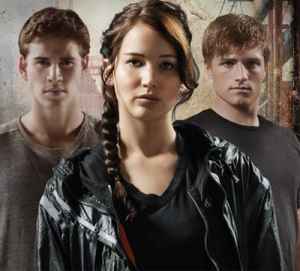
Rather than presenting Peeta as a funny, gentle creature, he was portrayed as forlorn, lovesick puppy. At the same time, Gale is featured as a bitter ex-boyfriend, or the heartbroken best friend. Yet, both characters serve as stark contrasts in more than just there relationships with Katniss. Peeta Mellark is a kind, gentle, all-around nice person that fans unfortunately care little about. What makes Peeta so formidable in the game is that he is genuinely likable, but the films portray him too heavily through Katniss’s own mistrust.
On the other side of the coin, Gale has been portrayed as a jealous, raging boyfriend more than as a rebel. He has been devalued as a person seeking vengeance and more as a young man seeking Katniss’s affection. If Hollywood continues down this path with the final film, there would be no further point to the war and everything would devolve into Katniss’s decision of who to end up with.
Sugarcoating the Capitol’s Corruption

There are a number of distinct things already left out in previous films. Hollywood wanted to make a movie that sold to a larger audience, and they made sure to remove a lot of minor details that the finale needs to hold any weight. The Capitol is awful, but the extent of how corrupt they – and President Snow – are is only barely touched upon. There are a variety of characters that are never seen or hardly given screen time. Yet, in the trilogy even the most minor characters are relevant.
1. Muttations
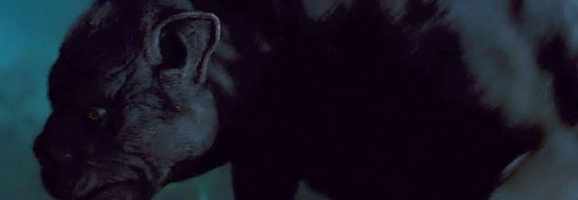
The first film failed to mention what makes the mutts so terrifying. The mutts are not only overpowered, man-made creations. The mutts are made to psychologically break the people confronting them. In the first film, the mutts at the end of the Hunger Games are made worse because they have the eyes of all of the dead tributes.
My head snaps from side to side as I examine the pack, taking in the various sizes and colors. The small one with the red coat and amber eyes…Foxface! And there, the ashen hair and hazel eyes of the boy from District 9 who died as we struggled for the backpack! And worst of all, the smallest mutt, with dark glossy fur, huge brown eyes and a collar that reads 11 in woven straw. Teeth bared in hatred. Rue… (25.16)
The Capitol uses more than violence to break its citizens, the governing power cleverly utilizes psychological warfare to truly break an individual. The Hunger Games: Catching Fire very slightly touches upon this with the Jabberjay scene, but not enough for the muttations to truly have any lasting affect.
2. The Avox
The Capitol and the higher level districts are maintained by the Avox. An Avox is a person with their tongue cut out and punished to servitude for traitorous actions. The first two films fail to mention or even present the Avox and – while they do not play pivotal roles in pushing the plot – are necessary to represent how evil the Capitol is. They punish without remorse and keep those punished around as examples. Katniss herself almost became an Avox when she went hunting out of District 12’s limits, and even witnessed two individuals get captured, only to see them later on as Avox.
3. Prostitution
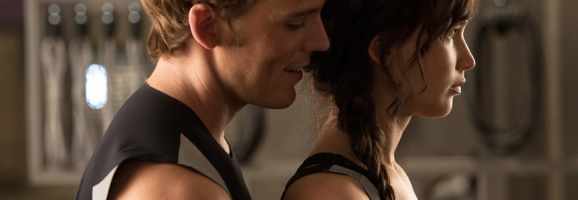
Sex has always been taboo in Hollywood. The first film is entirely fine with showing children dying at each other’s hands, but the minute it takes a step towards sexual transgression it leaps back. The second film touches upon Finnick’s fascination with secrets, but will the third and fourth film follow up why? Finnick dealt in secrets because it was the only substantial thing he could take control of as a child prostitute. Since winning the Hunger Games at age 14, he became a prostitute that served the people of the Capitol.
His experiences as a prostitute are both pivotal to the plot, and extremely important to represent the Capitol’s corruption. They take autonomy away in law and in the body and no one is spared. In a world where Haymitch’s entire family is killed for stepping out of the line, it’s no wonder that Finnick is so broken in the third book. Secrets are what kept him going during his days as a prostitute, and secrets are a pivotal point in turning the tides of war.
“Finnick was someone bought and sold. A district slave. A handsome one, certainly, but in reality, harmless” (171).
Distinct Lines of Good and Evil
What ultimately makes the final book powerful is the ambiguity between right and wrong. In order to win the war, the rebels had to make very distinct choices, but – ultimately – a majority of the characters were looking out for their own best interests. Even Katniss only wanted to fight in the first place so that she could save Peeta Mellark. Her distrust of others is a direct reflection of society’s inability to trust governing powers, so what can Hollywood do to ruin this?
Quite simply, Hollywood could draw a very distinct line that divides the Capitol and the rebels. Collins is unforgiving in her portrayal of corrupt governing powers, and further unforgiving in her critique of war. War does not have a “true” victor anymore than the Hunger Games themselves did. Rather, war leaves behind a series of victims on either end of the war. If the film fails to tread ambiguity then the death of Primrose at the end of the film will have less meaning. In fact, any of Katniss’s actions, either for the greater good or herself, will have little to no meaning entirely. If Hollywood only wants to praise the rebellion, then Katniss’s inevitable assassination of President Coin will be for naught.
It’s entirely valid to turn The Hunger Games: Mockingjay into two films. Although this decision may have been to get more money, it could be a very excellent decision provided that every necessary point is covered. The final two films are doing more than bringing the pages of the third book to life, they have to round out the missing parts of the first two films.
Works Cited
Busis, Hillary. “Best of 2012 (Behind the Scenes): ‘Game Change’ (and ‘Mockingjay’) writer Danny Strong on his biggest year.” Entertainment Weekly 1 Jan. 2012: n. pag. Web.
Carpenter, Cassie. “First look at Julianne Moore as President Coin in The Hunger Games: Mockingjay alongside the late Philip Seymour Hoffman.” Daily Mail 16 May 2014: n. pag. Print.
Goodman, Jessica. “How Philip Seymour Hoffman’s Role In ‘Mockingjay’ Will Be Produced.” The Huffington Post 14 May 2014: n. pag. Print.
McWeeney, Drew. “He’s in charge for the rest of the series, and that’s a good thing Read more at http://www.hitfix.com/motion-captured/francis-lawrence-on-making-jennifer-lawrence-angry-in-catching-fire#HX2pphZi9HmhbXc2.99.” Hit Flix 1 Jan. 2013: n. pag. Web.
Ryan, Mike. “Francis Lawrence On How ‘Breaking Bad’ Influenced ‘The Hunger Games: Catching Fire’.” Huffington Post 19 Nov. 2013, sec. Entertainment: n. pag. Web.
What do you think? Leave a comment.











Catching Fire was my favorite book from the series and I thought the movie did a fantastic job. I don’t like the decision to split up Mockingjay into two movies, but I’m excited to see more.
I think that splitting the movie into two parts is necessary to convey the deep emotional and mental processes and experiences that the books provide for their audience. To me, Catching Fire was of course entertaining, but due to the small amount of time required, they were unable to portray all of the intricacies of the characters inner worlds which make the second book different from the first. The books let us into that inner dialogue and I think that it requires more time than an hour and a half movie in order to truly get to the heart of these matters. Otherwise we are just watching kids killing each other again.
Just stop splitting the last book of any franchise in two movies. Ever since Harry Potter everyone wants to do it.
When I first heard/Saw the trailer to the first Hunger Games movie I laughed and discarded it instantly. Later on I heard it was a big hit and everyone loved it. Time went on and it finally hit Netflix. I let it sit there for a long time until late one boring night I decided to watch it. Long story short I couldn’t believe what I had been missing out on. Then the 2nd came around and it was even better. I cant wait for this movie.
Super excited for the film.
The names of the characters in this series are super weird.
They are mostly roman and stuff. From great novels of the past and or actual characters.Hell Panem(the country in THG) is Bread in Roman,and Bread and circus and The Boy with the Bread are are themes and characters that are very important to the plot
I will go to see this film even if it sucks. I think Seymour Hoffman deserves as many people as possible seeing his final work. RIP.
Dude, great post. I hope the movies improve on what was easily the weakest of the 3 books. Although I’m still peeved that it has been split into 2 films.
I read The Hunger Games Trilogy around two years ago and enjoyed the first two a lot, the third one however was possibly the worst piece of shit I’ve ever read. There was around 28 chapters if I remember correctly and fuck all of note happened until about the 23rd, and then it was just a rushed ending, it was like the author just said “Fuck it”, how they’re going to split this into 2 movies and make them good I’ll never know.
You do realize that the second book was basically the exact same thing as the first book? The third book actually had its own plot, and it was pretty eventful, I’m sorry you don’t have the brain capacity to understand the first 23 chapters.
Have to agree with you. Mockingjay has way more to it than people think. I feel Mockingjay gives the entire series meaning.
How people still hate on the third, I’ll never know. No idea what you’re talking about.
I thought the exact oposite. Catching fire while good was so….I don’t know. To many subplots to be carried over to MJ,and almost didn’t got it’s own identity….almost. But once I got the hang of it (AKA readed again and again) I got it. The same isn’t true for MJ. Read it in one sitting. Loved to death….haha get it? Death? Because that’s what this one have the most.
Ah, yes. I’m hyped for this film, Mockingjay!
I feel like MockingJay was unnecessary to the story. It got really confusing, and the whole “rebellion” idea felt very cliche’, but that’s my opinion. First book was well done, and could have ended there, while the second added a nice twist, and the third was unnecessary
I liked the first movie but I do not have high hopes for this one. I last book so pretty awful and I dont expect the movie to make it any better story wise.
I agree that book 3 sucked…I hated it for several reasons like it feels like she got bored with them and didn’t feel like taking the time to write batle scenes and just had her pass out each time something happened. That being said this is a chance to fix everything that was wrong with the book. The story really isn’t that great but if they can make it have more action than the book it shouldn’t be bad. Maybe show the first attack to rescue those people they could show in the movie. In the book she spent that whole time in 13.
I still think Hunger Games shouldn’t have had sequels at all.
Sadly every book only got worse after the first. Catching Fire the movie was actually better than the book. Prim dying by a contraption likely designed by Gale really caught me off guard at the ending though.
I like how she couldn’t decide which love interest she wanted Katniss to hook up with, so she just ruined both of them so she wouldn’t have to choose
I seriously do not see them pulling off many of the things the book had. This third one is too crazy to get right… especially in a pg13 film.
sooo excited for this! this is my most anticipated movie of the year! 😀
I personally preferred the second book. Better Hunger Games overall, and more interesting characters.
I literally couldn’t put the book down when I got to the halfway mark through the book.
First book was decent. I liked the concept. The main character’s reactions and events were not believable in the second and especially third book. Everything felt forced to make the story fit in the way the author wanted. The romance especially was bad.
For some reason I liked these movies less after I read the books. I feel like information is poorly told in the movies.
Love your article! I have always felt that the movies for these books (taboo as it may be to say) are actually better than the books. Katniss’s story is always from her perspective, while with the films they are able to cast light on more than one girl’s take.
I’m glad you liked it! And yeah the movies certainly have a ton of potential to be better, I think there just needs to be more respect paid to a lot of the more taboo things. The movies could have been amazing if they were not catered to PG-13.
Excellent article, Jemarc! You did a great job covering so many aspects of what’s to come. I am incredibly stoked for the movies to come and your article has only helped to further that! 🙂
Thank you dear! I hope the third and fourth movie suits your excitement!
mokingjay…the only one i didnt read, ill be awaiting the movies
Im reading mockingjay now its a pretty good book series just wish there was more lore or details about the history
That’s the thing,the lore it’s there,but it’s so deep in the subtle mind of Katniss that is hard to get it. It’s not in your face,that’s not the hunger games,everything in it it’s not to be taken on face value,the world,the characters and their emotions and interactions
Im just hoping they add new things and change some stuff from the book. The first two books i enjoyed reading but the third book was all over the place, literally and the ending imo opinion went from OMG to Really? -_-
Lets hope the movie will be better than the book.
Movie 3 Part 1 will probably end at the siege on district 1, after Katniss stops the slaughter.
I wonder if the ending will be different from the book. That was a pretty poor last few pages
I liked the ending. Less cliche than some other books I have read. I wasn’t entirely sure on the led up though. It was a bit slower than it should have been.
The pretty poor last few pages started about 300 before the end. The plot made no sense at all, nobody had any motivation for their actions and made TERRIBLE decisions because that’s the only way the story would work
A well thought out and articulated article but I disagree with your comment about not catering to the PG-13 crowd. Many great works of literature left the “taboo” topics hinted at and we all knew what was going on. Many of our imaginations are quite vivid and we do not need to see taboo scenes. Violence and language wasn’t so grahic and sex scenes were hinted at; I am certainly not naive but at sixty do not mind saying I blush at some of what is presented, which is not a bad thing. Should we all begin to blush again.
Hi Maria. I see where you are coming from but, at the same time, the films have been degraded in its themes. There is far less gravity to how corrupt the Capitol is in the films, and without referencing things like the Avoxes, and the Muttations, and especially if they cut out Finnick’s prostitution, the Capitol would seem less severe and corrupt than it really is.
As for blushing. There are a number of productions that are phenomenal that have done more than “hinted” at the sexual. For example, William Wycherly’s “The Country Wife”, or Aphra Behn’s (to reference a female playwright) “The Rover”.
One of the best articles I’ve read on Hunger Games.
Hey Jemarc, this was comprehensive and perfectly summed up what happened in the Hunger Games! Keep up the good work!!!
Wonderfully comprehensive–I loved the quotes you used and that you included how Hollywood can screw up. Took the words out of my mouth when you talked on the prep team and the love triangle!
I feel like they will expand so much more since they have to movies to work with. Here’s hoping!
~Constellation
Thank you! With two movies coming out they have all the opportunity to expand, let’s just hope they actually take advantage of that =].
I first read the trilogy quite a while ago. Parts of Mockingjay were hard to read, especially what happens to Gale and how he changes. And I think we all now know in this country that power corrupts. This story does not sugar-coat and all the good guys or innocent ones do not live in the end; everyone and everything is changed by war. And that is uncomfortable. A book will always possess the power of detail, thought and use of one’s own imagination, qualities that a movie just can’t touch. Suzanne Collins’ book sales prove an appeal to these stories and that just can’t be denied. I personally have re-read the books more than once, because of the conversations they have generated, and continue to generate (like this article). Making a movie can be tricky, but done well can be so powerful in its own way. With Nina Jacobson so present during the making of all the films, especially Mockingjay, and Francis Lawrence’s extraordinary talent expanding throughout the production, and a beloved fan base that includes both of them along with the cast, I am very much looking forward to going to watch the films when they come out. I hope there are parts that will be hard to watch and that will compel more conversations, because that is what a great story (book/film) does. They all certainly have our attention and it will be great to see what they do with it.
“I hope there are parts that will be hard to watch” is essentially what I am hoping for. My issues with the first two films are that they are primarily entertainment (though the first two books could be argued to be that way). What is so great about the moments in the last book is that they spur dialogue, as they should.
A movie has to entertain, but to what degree may be what you are leaning with. There were hard moments to watch in the first two movies and I was taken by many scenes – Rue’s death and Katiss’ compassion to it that spurs the reaction in District 11, Cato’s final demise and his own realization of what his life had become. Katniss’ first flashback as we see her looking so innocent as she hunts the turkey that morphs into Marvel and horrifies her. (We live in a country where we think 16 year old girls should not be horrified, yet for many others living in war torn areas, their experience is something else.) When Peeta and Katniss travel to District 11 and they first come out on the stage and we see the holograph of Rue, it is heart-wrenching. When the old man is shot we don’t see everything, but we don’t need to because the impact is so strong. “Katniss, you never get off this train.” She is trapped forever and what will she do with that? What do they all do with that? We will get to see.
I heard a rumor, a whisper really that the movies might cut out Prim’s death at the end. Make it so she doesn’t die at all. I’m not sure because I can’t verify this but if it’s true… I’m actually not complaining. Her death is a pivotal moment for sure… but it’s just too tragic. I won’t be surprised if they cut it out just to keep it PG-13.
But you are right. The film has to get a lot of things right or later events will have less meaning. If they fail to capture Gale’s rage at the Capitol and its corruption which they have thus far failed to do, Prim’s death will have less meaning and if that has less meaning, they might as well let Katniss kill Snow and leave Coin alone. If they keep Prim alive, it’ll be better that they allow Katniss to kill Snow because she won’t have a reason to kill Coin.
Then, there’s the seemingly insignificant granddaughter of Snow. There’s a reason they threw her in and I do wonder what it is…
The only reason why the granddaughter could possibly be introduced in my mind is to heighten the urgency of Coin’s decision to victimize the Capitol children.
Your quotes really drive everything home. Especially the ones from the books; I actually started feelings things that I felt while reading the book in your article. You did a killer job~
Haha thank you so much. Writing this article helped me like the book series more than when I originally read it.
I love Julianne Moore.
There’s tons of hate for Mockingjay, which I feel is mostly unjustified. It’s an very weird book, in both structure and story, but in the end, I found it to be the best of the three. It managed to succesfully show the cost of survival on Katniss’ psyche and the absolute horrors of war. I also found the ending to be incredibly powerful. It feels awful because that’s the point. It doesn’t end in a glorious climax of action. It ends with one single arrow showing that, in the end, nothing will come easy and power is an illusion.
You make a very good point, I actually had not considered why the arrow as so much more pivotal than a big bang of an ending.
I think you’ve really tracked some of the upshots and pratfalls of turning such layered literature into a Hollywood blockbuster. By no means am I suggesting there cannot be a happy medium, but it is a tenuous line to walk – especially when the source material is so loved. Two of the things you pointed out, the simplification of struggle to good/evil AND reducing all of the systemic problems to Snow, were really illuminating. Part of what I, and I imagine many of the trilogies readers, enjoyed was how complicated institutionalized systems of oppression were. Granted, Collins didn’t use this language, but everything from geography, industry, capital, and the social components speak to Panem’s precarious reliance on exploitation of all kinds. The Hunger Game’s Trilogy, at least for me, begged for action, some kind of social justice. I’m not sure this can translate effectively to the silver screen…especially considering the role it and other media play in terms of systemic power. I’ll certainly still see the films, but it’s a bummer that some of the more empowering qualities can’t bridge the gap.
Your comment is very insightful and certainly aligns with my own views. Like I said in the article, I’m rather worried about having to make up for the failures in previous films.
I have read all the books and I know that the adaptations can’t do everything but I really wanted to see two specific parts in the movies. The first part is where they have the interviews of all the tributes in the victor’s village for each district. You already know how much peeta cares for katniss but it shows so much in it, and builds up to seeing his painting of rue during the try outs. Also during the tryouts they did not show the scores for each tribute. Peeta and Katniss both receive 12’s, which is perfect, so it shows that their situation is dire from the beginning. The other thing I wanted to see was peeta and katniss viewing the previous victor’s competing. They are watching them to see what the weaknesses are of possible enemies, but they come across haymitch’s participation in the games (which was a quarter quell). With all that said, this movie was pretty parallel to the book, incredible, the acting on everyone’s part, and so emotional/powerful. I hope the next movie does well, the direciting change from 1 to 2 has shown great upside. If finale(s) are just as good, you can put it up there as one of the greatest book to movie adaptations of all-time. Not saying THE GREATEST, but among them.
never read the books but its damn good movie franchise.
I had just recently watched The Hunger Games: Catching Fire. It was 10 times better than the first one. What an amazing movie. And I truly hope it will continue to be, even though it may suffer since they are splitting it in two parts.
Still need to get round to watching others
If they were going to make a two parter, I would have preferred it be catching fire.
The ending of the books is really bad, the whole thing is kinda sloppy and paints a bad picture, though that BIG MOMENT is handled so badly in the book, you have no reason to feel.
What part of the end do you dislike in particular?
People criticizing the third book have to understand that it is told from Katniss’ point of view and because of her PTSD and depression and dealing with the huge pressure of being a symbol of the rebellion and a leader in district 13 and handling the guilt of District 12’s destruction and being unable to protect Peeta causes her to be an extremely unreliable narrator. That is why the pacing seems off, that is why Katniss doesn’t seem like herself, that is why its harder to interpret what is happening. You must remember how much has happened to her in 2 years and realize that she didnt ask for any of it and then realize that she is a child. I know I would be a little insane if I had experienced the same things she did when I was 16/17.
Agreed, I loved the whole chaotic/weary/sort of losing her grip feel of mockingjay.
I was like wow, they really aren’t sugar coating what war and the hunger games does to people and the writer earned my respect for that.
It was not the glossy, everybody wins ending that I had predicted
This is why 1st person POV writing can be a crutch as well as handlebars. Easier to write when you only really deal with one person but you also miss out when Katniss blacks out, falls off a ladder, gets lost in Gale’s eyes……
I am looking forward to the epilogue. It was so amazing I cried my eyes out when I read it.
I don’t like the idea of splitting it into films because I don’t think they have enough material to fill the time. The end of catching fire made it sound like they were removing the first third if Mockingjay where they discover District 13 … Still, I trust the director. The hunger games film adaptions are probably one of the best I’ve ever seen.
Congrats on having your article on the billboard 🙂
I don’t think they have enough material to fill the time directly from the book, but because the movies have not all been from Katniss’s perspective I think they have the opportunity to show scenes that were only alluded to in the book. 1. The destruction of District 12. 2. Peeta’s rescue. Stuff like that.
Also, thank you =]
That’s what I was hoping for as well. Showing things from other character’s perspectives might save it.
Mockingjay is my favourite book in the trilogy, and I really like the split. Most people don’t understand that is not he number of pages what matters, but the content. Mockingjay has a broken Katniss, and she is not aware of a lot of the events around her, or at least, she’s not present when the events happen. All of this takes place especially in the first half of the book, so Part I will took a lot of opportunities to expand the world and to show us the events that we don’t see in the Capitol (like in THG and CF) and at the same time will expand what we only heard (Peeta’s rescue). So I think that Part I specially, is going to surprise a lot of people who thinks is going to be “boring”. One more thing, the deaths that occur in the book are staying, so don’t worry. Francis and the crew had showed us how involved are in the story and into making a really good adaptation. And I also think the writers are spectacular (The article forgot to mention Peter Craig) I have a lot of faith and respect to the people behind this, so I’m pretty confident that the finale is going to be as good (and better) than in my mind.
PS: One more thing to add, Finnick’s backstory is going to be told, we had a hint of it in Catching Fire, when Snow spilled blood from his mouth. And the Avoxes are going to be explore too, Nina Jacobson (producer) stated it in the audiocommetaries from Catching Fire.
Catching Fire went down as one of my favouritest movies i’ve ever seen, should i be worried? It blew me away
I just finished reading the trilogy yesterday. Book two is great – book three is horrible.
Never read the books so I might not have a ton of credibility here, but the 2nd movie looks a lot like the first(which I enjoyed). So I sure hope that book/movie 2, 3, and 4 are uniquely stimulating… if that makes any sense.
That’s because Books 1 and 2 basically had the same subplot regarding the games, with Catching Fire (2nd book/movie) being a hell of a lot more grander with its Hunger Games.
But that’s not the only thing going on in the story anymore, so expect a lot of non action pieces as well. if you liked Hunger Games, youll enjoy this one.
Book 3 is drastically different, I enjoyed it but some people didn’t.
It’ll be interesting to see how they pull it off with a pg13 rating cause it goes to some pretty dark places
Catching Fire was surprisingly good. Will see this.
I havent read the third book (seeing the movies first for a change), but from everything Ive heard from people I know, this book is not only the worst of the three, but has no need to be split into two movies from a story perspective. I’m worried about how the last two will turn out
Ignore anyone who says Mockingjay is the worst of the three. I actually enjoyed it the most. As for splitting it into two movies, it just means that more of the book will make it into the film.
Mockingjay was my favorite out of the three, so the whole thing about the third book being terrible is subjective. Mockingjay is definitely depressing, so if you’re turned off by depressing movies then you most likely won’t like Mockingjay.
Jemarc,
I enjoyed your reflection on these two aspects of entertainment, with your deep analysis of each main character from the third book in the series. However, after devouring the third novel I looked and dug for commentary paralleling this trilogy with our current state of American society with disappointing results. Do you have any thoughts on that matter or deeper insight than most bloggers out there? I would really appreciate reading that. Also, after taking Rhetorical Theories of Persuasion this summer I learned about Aristotle’s Catharsis, from his book, The Poetics. Aristotle theorizes that an audience possessing unrest and indignation towards their government can experience a work of art (film or literature in this case) and go through the process of Catharsis in which their emotions of fear or pity are escalated until the plot takes a restorative turn and the emotions are purged from the audience. To break it down: an audience who was feeling angst for whatever reason watches the Hunger Games becomes more zealous to a rebel cause; the plot shows renewal and peace and the audience’s emotions have been cleansed with the storyline leaving an apathetic audience. Contrary to what I formerly thought of the author’s intentional purpose for this series it appears to me that any revelation sought to be achieved with these forms of entertainment remain just that: passive forms of entertainment according to Aristotle, at least.
Cheers,
Shelbz
Hi Shelbz,
I apologize for not responding sooner, your comment gave me a ton to think about and I wanted to approach it with a lot of thought put in.
In regards to how this the trilogy can reflect current society, I think that the proof is in your seeking results from the blogosphere. No longer are we able to attain our own conclusions without accessing mediated information. Everything that we know and believe to be true is mediated to us and we relinquish our own autonomy because of it. For example, have you ever heard someone describe an event and relate it to a movie?
“Oh my God, the shoot out was crazy, it was like…well have you ever seen _____?” I forget the term right now (but there is a term for it) but basically we live in a world where we do not realize that a “film” is fiction and that these fictitious worlds are taken from reality.
As for Aristotle’s Catharsis, I believe that there is always merit in that and how society progresses. Look at Post 9/11 America, or even Cold War America. The films produced at these times were very PRO-America. Post 9/11 films explores a lot of otherization and alienation as that is what was “necessary” in order for the supposed “war on terror” to be fought. When, in reality, the “war on terror” was a “war on Muslims”.
I think the Hunger Games popularity at this time is the general unrest with how the government has functioned. We were thrown into a war and are still not out of it, everyone always has some complaint no matter who our President is, and America is starting to realize its mistakes post 9/11. Hunger Games kind of mirrors Star Wars in this sense.
(This is totally tooting my own horn and I apologize) I wrote an article about Lucas’s inspiration from the Vietnam War in regards to Star Wars. In the original films, the evil empire can be represented as America whereas the rebel alliance is Vietnam being attacked. The Hunger Games can be presented in the same way. The Capitol can be America whereas the rebels are the Middle East. However, as humans are vain creatures, we (the people) perceive ourselves as the rebels fighting against a cruel government system (Bush in power, Obama in power, pick your poison) so that we may retain our autonomy.
I hope that all makes sense!
Jemarc
Very impressed with the obvious time and effort that went into this article. Personally, I think book three was a necessary evil. The author was looking for conclusion and though the plot dragged, she did accomplish her goal. Based on that though, Hollywood has their work cut out for them to liven up the dry nature of the third installment in order to fill the two part conclusion.
All in all, this is a comprehensive look at what is to come and I was able to find points that I had yet to consider. Well done.
I think Hollywood has a lot of opportunity to liven it up just because they can pull away from Katniss’s perspective and bring to life scenes that we do not experience first hand in the books. =]
At the same time they might have to liven it up at the cost of the emotion or staying true to Collins’ story at all. I think every book lover has seen a story butchered by Hollywood in their quest for “entertainment” (last airbender xP).
MockingJay was a horrible book. Plot threads are uninteresting, Katniss annoying and indecisive, details excruciatingly bad, characters who die are given only 3 sentences of a lackluster death scene and overall execution was horrendous. It felt like Suzanne Collins gave up while writing the book 1/8 of the way there.
I enjoyed The Hunger Games, so I can’t wait to see this film online.
Had no expectations for these movies and ended up loving them, didn’t know the third was out so soon, can’t wait!
awesome franchise!! the last one set the bar high too!! cant wait!
I can’t wait to see and listen Katniss saying: “If we burn, you will burn with us”
I’ll make a fanboy scream when she finally says it
I can’t wait! These movies are so awesome!!
Personally found the first pretty over-rated
I haven’t read the books so I found some of your points very interesting. Interestingly enough, you say that Finniks past was barely touched upon, yet I did guess what is was even though it was only hinted at in the movie, so maybe hints are more powerful – makes it seem like it’s a secret that the audience slowly let in on.
I also think that the love-triangle section was interesting. As i said, I haven’t read the books, but I do find it interesting that the (real-life) media, filmakers and audience focus so much on the love aspect, when Katniss has that one little line in Mockingjay that mentions how silly thinking of love is given the circumstances. I think it could have been made more clear when she is playing Peeta for her own ends.
Thank you for the comment. I think that it’s entertaining that the book – in a way – serves as a critique of its own films (even though the books existed prior to those films).
Alot of things happen in Mockingjay, so I think the movie could be spread out into two films. The first two movies barely scratch the surface of the Hunger Games Universe. They’re good movies, but they’re structurally very similar. Hopefully they take risks and make these two movies more ambitious than the books (while keeping certain things like character deaths and the general plot…)
Catching Fire was great. I just hope the two Mockingjay movies don’t end up feeling really bloated and full of padding.
Great piece! I loved the breakdown and analysis you did
I think both movies—while missing important aspects like Avox’s—were better than the books, especially Catching Fire. Hopefully the filmmakers take the opportunity of a compelling subplot aka Peeta’s torture into madness as a way to make the movie more interesting than direct scene-for-scene translation of the book. The omniscient narration the films provide lend a story that could be much more interesting than simply following Katniss in her grief. Personally, the first person narrative in the books is the reason I enjoyed the movies more, because Katniss’ voice can be very annoying—thus making movie-Katniss more likable. I’m hoping that the two-parter doesn’t ruin the franchise, and they spend more time on the final scenes than Suzanne Collins did.
I’m hoping the final movie makes some serious changes to the book’s finale. If it does not, I expect a huge negative reaction to the movie.
1) Coin should not send a crazy, unstable Peeta into Squad 451. And he definitely should not tag along with Katniss on her assassination mission. I thought it was way too forced/contrived feeling in the book, and it did not contribute anything of value to the plot
2) I think there needs to be at least some minor foreshadowing that indicates that President Coin is capable of evil. It shouldn’t be so sudden like it is in the book
3) I’m not sure if Katniss will even go on the assassination mission anymore, because in the book, her desire to “KILL SNOW” is an important part of her demands to President Coin. In the Part 1 movie, that demand never appears. But assuming she does go onto the mission still, I think it needs to accomplish something. In the book her mission just gets her friends and teammates killed, and it all feels very pointless. Watching Katniss accomplish nothing and get most of her team killed for nothing isn’t how I want to see this trilogy end. So I hope something good comes from her mission, even if it ends up being a big failure, it should have some good come out of it.
4) Maybe this is cliched, but I think if Katniss goes on the assassin mission, her teammates should all join her mission voluntarily. In the book they are kind of pulled into it by Katniss through deception, which I thought was very awkward.
Such a GREAT article, probably one of my favourites so far! Your analysis is really thorough and insightful. You always back it up with details from the books and the structure of your paragraph makes the article flow and easy to read. And your writing style instantly draws us into the subject and we want to finish the paragraph as quickly as possible to get to the next one! Fantastic job 🙂
The last book was a bit of a disappointment for me to be honest, I found it redundant (especially in the structure of the chapters and the writing style) with less action, and when there was action it was not fully developed. I can’t really see how they are going to make 2 films out of it, but I hope it will be good. I liked the second one better than the first (like a lot of people) and the first two books were really good, but my expectations are quite low for the third one… We will see.
I really enjoyed your coverage of the considerations that will have to be made for the Mockingjay movies. Without repeating what several posers have said already, I think you covered many really good points that I have not seen spoken about before. I really hope that the movies live up to their potential, too.
Great article! Although I am (very) late to jump on the Hunger Games bandwagon I look forward to both reading the books and watching the movies. However, being a big reader I will HAVE to read them before watching the films so it captures the essence of the author’s original message.
I am most excited about Robert Knepper being in the last films. He is one of my favorite actors and deserves to get placed in a big blockbuster for once.
This essay shines much light on the fact that Hollywood can do, well, pretty much anything, “…Hollywood can ruin the entire franchise by … [making] Katniss Everdeen something she is not”, and it can certainly do the same in any arena of life they wish to distort. As sad as it may sound and as relieving and freeing it is for myself, I am no longer such a Hollywood fan, as I am an independent fan because the real “art” is no longer being created in Hollywood, just ideals being pushed, ways of life being manufactured towards ritual consumerism, idolatry advertised and corporations getting stacks, it gives me anxiety just thinking about all the work they do to, MAKE MORE MONEY.
That’s why Hollywood will fall off as an art standard, though they will not lose their influence overnight, they will fall off eventually and give rise to the independent stage. It’s funny how I literally would not have been able to say that a few years ago… somethings happening! A great awakening perhaps?
Cheers,
Nick
Generally, I believe expectations need to be kept low when watching films based off books as they are two different pieces of text. However, you have made strong arguments that could be used as guidelines when translating a book to film. I really enjoyed reading this. Thanks!
It is to be expected that to cut a book into a 2 hour movie that they will be missing on a few things. But with that said I personally think that they will be able to do great things with mockingjay especially since they are making it a two parter. they will be able to get more detail in this way and it should go above and beyond everyone’s expectations. Great article though!
I’m not a fan of how movies of books are all suddenly being split in two but hey, to each their own. I just know I need to reread the books before seeing the movie.
This was a really in depth look what they can do with the movie and made me even more excited to see it this weekend! I think they have done a great job with the other movies – although I agree that they are several things they sugarcoat to bring the rating down to PG13 – so I’m looking forward to see how they handle Mockingjay.
I agree especially about how they have not shown that the muttations are actually all of the past dead tributes, both in the first film with the dogs and the second film with the baboons and the Jabberjays.I haven’t seen the first part of Mockingjay yet, but the first two movies were good translations of the books. Of what I remember, I read the books and watched the movies a long while ago, they kept all of the important scenes needed to present the story line from the books. I do hope that they reveal all of the things that you’ve mentioned in “Part III: How Hollywood Can Blow It.” They need to be clarified because of their importance in regards to the character developments and the portrayal of the Capitol as well as the Rebellion. Good article!
Some of the leaders have the names of ancient Greco-Roman figures: Plutarch (Greek philosopher and historian), Livia (wife of Emperor Augustus and mother of Emperor Tiberius) and Cato (Roman Senator) to name a few. There’s probably more of a reason these names are there besides novelty.